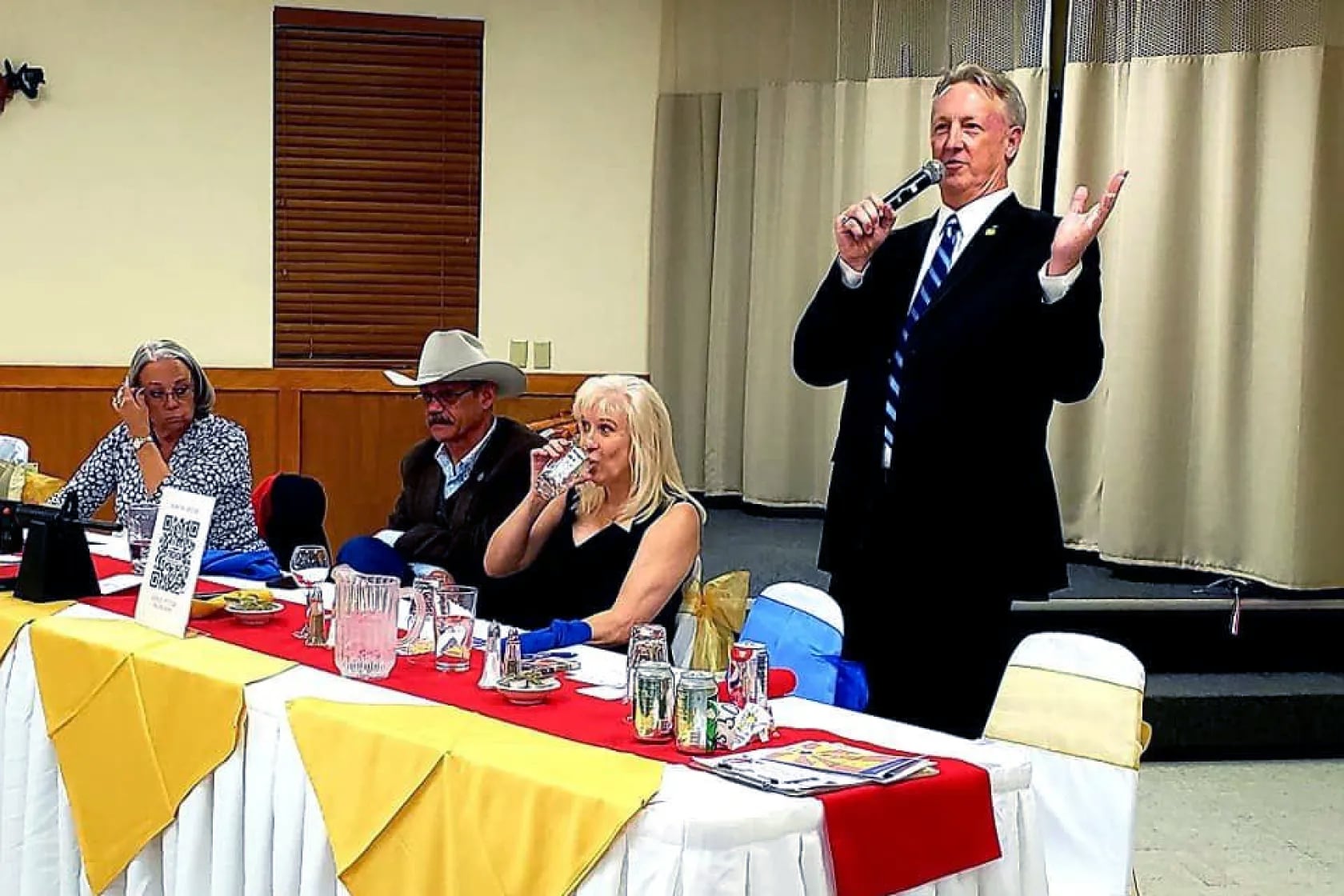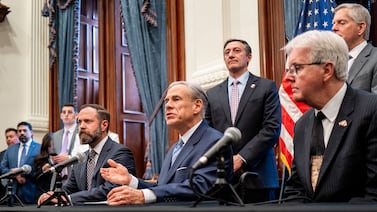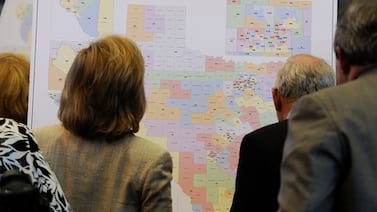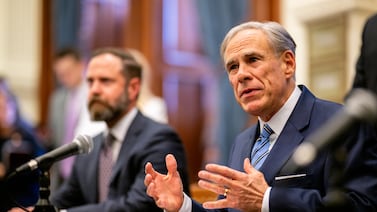Votebeat is a nonprofit news organization reporting on voting access and election administration across the U.S. Sign up for our free newsletters here.
Update, Aug. 8: Cochise County supervisors tabled the vote on the Authentix contract until a special meeting on Aug. 22.
As an Arizona county prepares to spend up to $1 million in state money to test anti-counterfeit features on ballots, it appears the project was tailored for one company in particular that has pushed the idea with the help of political allies in the state for more than two years.
The idea of adding unique features such as watermarks to ballots is gaining steam as a way to both protect against fraudulent ballots and improve voter confidence. But because the Cochise County pilot was crafted so specifically to describe Texas-based Authentix’s products, election technology experts say it unnecessarily limits the competition for the work while testing unnecessary and expensive products that might even make ballots unreadable to vote-counting machines.
Alex Gulotta, Arizona director of voter advocacy group All Voting is Local, called the venture a “boondoggle.”
“It’s designed specifically to benefit this particular company, and it’s solving a problem that does not exist,” Gulotta said. While Arizona’s failed GOP candidates and leaders have claimed thousands of fake ballots were inserted into Arizona’s 2020 and 2022 elections, courts have found no evidence of any.
But Cochise County supervisors are set to vote on Tuesday to contract with Authentix, as well as one other company that applied independently. The companies say they will test ballots with features such as watermarks, invisible ink and text, and unique dyes prior to the 2024 presidential election.
Texas-based Authentix specializes in authenticating other types of documents such as tax notes, particularly for foreign governments including Pakistan and Egypt, but appears to have never worked in elections. Still, the firm joined forces with former state Rep. Mark Finchem in 2021, who lost his 2022 bid for secretary of state, to convince state lawmakers across the U.S. to make their products mandatory in ballots.
Finchem has acknowledged a connection to Authentix but revealed few details, telling the Washington Post in 2022 just that he was connected to the company through “somebody who knew somebody.” The connection appears more direct than that. Votebeat found that one of Authentix’s founders, Olaf Halvorssen, was listed in 2021 as a team member of Finchem’s Idaho-based energy nonprofit, Clean Power Technologies, according to the nonprofit’s now-defunct website.
Authentix did not respond to two calls requesting comment or an email with specific questions. Upon visiting Authentix’s lab in an industrial office park in Addison, Texas — a suburb immediately north of Dallas — a Votebeat reporter was told to consult the company’s website. The company told the Post in 2022 that it did not have current connections to Finchem, who may run for state Senate.
Neither Halvorssen nor Finchem responded to requests for comments.
Finchem’s close friend, Cochise County Recorder David Stevens, will be overseeing the project. He’s helped Finchem promote the idea from the start, by offering a county ballot for use in demonstrations and attending meetings.
Stevens, who also didn’t respond to requests for comment, was the only recorder in the state to apply for the state money, even though all counties were eligible. That may be because the grant was written in a way that allowed only county recorders, not elections directors, to apply, even though in Arizona elections directors typically order and design ballots.
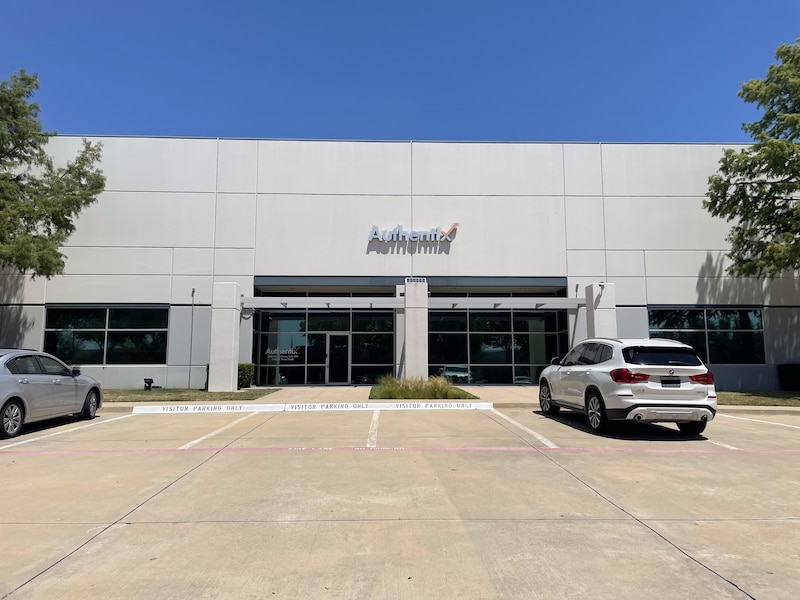
“Glitter and holograms”
Cochise, a mostly-rural and heavily-Republican county in the southeast corner of the state, appears poised to keep experimenting with election procedures after a tumultuous November in which the county supervisors initially refused to certify the county’s election, and tried to illegally hand count all ballots as part of a post-election audit. Both efforts failed after courts ruled against the supervisors.
Stevens is just now putting the contract with Authentix, along with a contract with election vendor ProVoteSolutions, up for supervisors’ approval, even though the initial deadline for the state grant was in May. The Arizona Department of Administration extended that deadline to September 30 in a letter sent to the county on Thursday.
Authentix and ProVoteSolutions applied for the grant separately and did not coordinate their bids, but Stevens is proposing to hire both of them, according to Tuesday’s meeting agenda.
While the two Republicans on the three-member board are generally supportive of Stevens’ initiatives, meaning the project is likely to move forward, Republican Supervisor Tom Crosby said in an interview last week he doesn’t believe this is the way to make for more secure elections, in part because it doesn’t address his concerns with the lack of tracking of mail-in ballots.
“These ballots, with all their glitter and holograms, we are all going to feel safe, but it does nothing but prevent counterfeit ballots,” Crosby said, adding, “We think. Assuming that some dirty dog isn’t selling ballot paper where they shouldn’t be.”
As GOP leaders in Arizona advocate for laws that would limit all voting systems to be produced by U.S. companies with U.S.-made parts, Votebeat found that Authentix does much of its work with foreign governments and relies heavily on a contract with state-owned company Saudi Aramco, and it’s unclear whether it would get its paper and produce its products in the United States.
Republican Supervisor Peggy Judd said she hadn’t looked into Authentix but said she would only have a problem with the company if they were “affiliated with the mob or China.” Told about Authentix’s background, including its work for Saudi Aramco, Judd said she didn’t have any concerns.
Pilot tailored to Authentix
Stevens had few rules to follow for how to run the pilot, which the Legislature created last year.
The state grant simply directed recorders to test out different ways to make ballots more secure, and it couldn’t be in a way that would reveal the identity of an individual voter.
But Finchem had written a detailed roadmap for Stevens to follow.
Finchem started researching ballot security in late 2020, when “there were rumors circulating that somehow ballots had been secretly watermarked,” according to an Oct. 2021 fundraising email he sent out to supporters. Finchem acknowledged that the rumors of watermarked ballots were false, then said, “But it got me to thinking, what if they could be?”
He said that led him to being introduced to an Authentix executive, who said in the fundraising letter that’s when Authentix started to produce new technology for ballots.
In March 2021, Authentix and Finchem made their first big secure-ballot pitch to Arizona lawmakers. Finchem sent out an invitation to state lawmakers to attend a presentation by Authentix about “ballot fraud countermeasures,” according to a copy of the invitation obtained by Votebeat. Stevens replied to the invitation with a “YES”— he would be attending. The presentation took place in the basement of the state Capitol, and Stevens provided a Cochise County ballot for the demonstration, according to the invitation.
In October 2021, Finchem organized a “Ballot Integrity Summit” at Authentix’s office in Addison, Texas, trying to convince visiting state lawmakers to make Authentix’s features mandatory. Stevens, along with state Rep. Leo Biasiucci, attended. The Washington Post subsequently found nearly identical bills describing Authentix’s products in 2022 in four states, including Arizona.
Finchem proposed the initial Arizona bill on the topic in 2021, and another lawmaker picked it up in 2022. The bills, which both failed, would have required the state to use a specific list of 19 security features on ballots — features that closely mirror the products Authentix offers.
Stevens took the first 13 security features on that list and published them verbatim in his request for proposals for the pilot program, asking contractors to explain if they could provide the service.
The requests are very specific. For example, the request calls for “two-color rainbow print invisible ultraviolet numismatic designs with fine line security relief design that follows the primary images’ design exactly and with a minimum line weight of 0.0424 millimeters.”
The vast majority of these security products are not currently used on ballots in the U.S. — some of them for good reason. “Secure holographic foil,” for example, may be reflective, which could cause the ballots to be unreadable by ballot tabulators. Stevens also requested bar codes, which, if they are unique to individual voters, could make the voters’ individual ballots identifiable.
Authentix answered the specific requests from Stevens with near-verbatim wording.
When asked for “secure holographic foil” with “branded overprint of any hologram,” for example, the company responded that it provides “highly secure holographic foil” with “branded overprint of the hologram.” When asked for “unique, controlled-supply watermarked clearing bank specification 1 security paper,” Authentix said it could provide “genuine watermark cbs1 security paper that cannot be obtained by any other company/individual.” Authentix did not say how or from where it would procure the paper that no one else could.
ProVoteSolutions, which prints election materials for several California counties, also had responses to the requests, although the company sometimes appeared to try to explain why the requests didn’t really make sense for U.S. elections. That type of security paper, they wrote, was generally created for a European market. And while it could do a background image that covers 75% of the ballot, “we have found that invisible ink could affect the black timing marks and OCR sections of a ballot.”
Some of the specifics apply more to Authentix’s current market: authenticating tax notes for foreign governments, which sometimes involves using encrypted bar codes, according to Authentix’s website.
Authentix did not list any recent election-related experience in the information it provided to Cochise County.
Of the five projects the company listed, three were contracts to produce tax stamps for foreign governments — Pakistan, Egypt, and Ghana. The other two were secure document and medical prescription programs for unnamed clients.
As of 2016, one of the company’s largest contracts was tagging overseas fuel for state-owned Saudi Aramco, a contract that was critical to the company’s valuation, some of the company shareholders told a court in 2020. Authentix also has a team based in China.
Ann English, Cochise County’s lone Democratic supervisor, said she is not sure why Stevens is trying to work with companies “that print for banks, not ballots.”
English called the pilot project “another solution looking for a problem that does not exist.”
“The whole process of secure paper has escalated to the point of ridiculousness,” she said. “If a person tries to vote twice, the system will not allow it. End of story.”
Cochise County resident Ali Morse said she is concerned by the connections between Authentix and Finchem, and Finchem and Stevens, especially since “there’s a boatload of money to be made” if Arizona counties start using secure features on ballots.
She also thinks it’s all a little much.
“The sophisticated security features that Authentix advertises are unwarranted overkill for our ballots that have no history of being fraudulent,” she said.
Morse reached out to other county recorders in the state to see why they didn’t participate in the pilot program. Emails she provided to Votebeat show many recorders told her ballot ordering is the job of the elections director.
“Tremendous scrutiny”
After the 2020 election, Finchem claimed without evidence that 35,000 fake ballots were cast in Pima County. Shortly after that, Finchem started working with Authentix on what he said was a solution to the fake ballots, even though he provided no evidence that fake ballots existed.
David Levine, senior elections integrity fellow at the Alliance for Securing Democracy, says this may be an example of the “cottage industry” that spreads the stolen election narrative, and then profits from it.
“I think this entire situation deserves tremendous scrutiny,” Levine said.
Still, separate from the Arizona pilot, election officials, state lawmakers and vendors across the country are exploring ways to increase the security of ballots, recognizing that some voters would feel more confident if they had a way to authenticate individual ballots. ES&S, for example, is evaluating paper technologies and “plan to make [those services] available at a future date,” company spokesperson Katina Granger said.
California has had a law requiring watermarks for decades. Georgia started putting a security feature in ballots in 2019 and made it a requirement in 2021, and Tennessee also enacted a new law requiring watermarks on all ballots that year.
But those states all just use one secure feature – in California and Tennessee, it’s watermarks, and in Georgia, it’s something baked into the paper that a tabulation machine or special wand can identify. In contrast, Cochise’s pilot is considering more than a dozen different security features.
Gabriel Sterling, chief operating officer for the Georgia Secretary of State’s Office, said the smart way to go about it is to work with the election vendors in the state and with counties to see what’s practical and cost-effective.
Sterling said that the numerous products in Arizona’s pilot seem like “overkill” and said officials in the state should be working with machine manufacturers or they are just “shooting blind.”
The rules vary on how the secure features in these states are verified when ballots are returned, but it’s generally left up to local clerks.
While checking for watermarks is relatively easy, as they are visible to the human eye or with special lights, it’s unclear how local election officials would be able to check the authenticity of the proposed features in Arizona, which is crucial for this idea to work, according to the OSET Institute, an election technology nonprofit.
The Arizona pilot will test if certain features can work in ballot tabulators, but the manufacturer of Cochise County’s voting machines, ES&S will not be helping the county with the testing, Granger said.
Along with planning to hire Authentix and ProVoteSolutions, Stevens has already ordered ballots and a watermarking device, called a dandy roll, from Runbeck Election Services. He paid Runbeck $187,500 for the supplies in January, according to a receipt obtained by Votebeat, and asked the state for reimbursement for the items.
Authentix’s proposal has a cost of about $2.75 a ballot, about double the cost of ProVoteSolutions’ ballots, at $1.30 to $1.40 each.
Levine said that in the ideal situation, the requirements for companies wouldn’t be so specific, to enable more competitors, which makes the products and the prices better.
“What we have here is a barrier to the competition that is becoming a barrier to improve elections.”
Jen Fifield is a reporter for Votebeat based in Arizona. Contact Jen at jfifield@votebeat.org.

